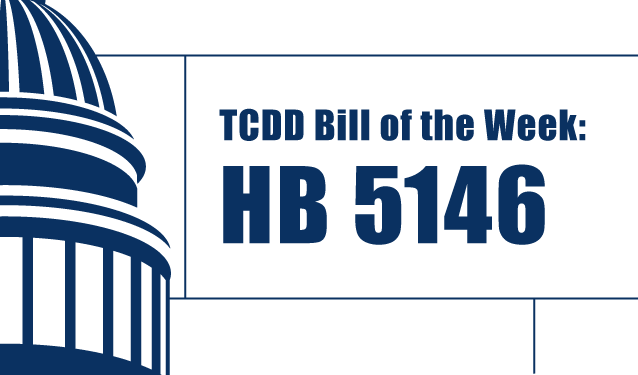HB 5146
HB 5146

For this weekly feature, we profile a noteworthy bill that is going through the legislative process. The bill may relate directly to TCDD’s Public Policy Priorities or another disability-related issue.
Table of Contents
Bill: House Bill (HB) 5146, relating to the establishment of the Building Better Futures Program to support educational and occupational skills training opportunities and support services for students with developmental disabilities (DD).
Bill Author: Rep. John Raney, House District 14 (College Station)
Joint Bill Author: Rep. Mary González, House District 75 (El Paso)
Share this bill
We’ve created a Bill of the Week one-pager (PDF) for HB 5146. This is a simplified explanation of the bill that you can share with your representative and personal network.
Background
The federal Higher Education Opportunity Act of 2008 created a new type of college program for students with DD. Comprehensive transition and postsecondary (CTP) programs support students with DD to continue academic, career, and independent living instruction. This helps students prepare for gainful employment by facilitating educational and occupational skills trainings and support. The federal law provides access to federal student aid for students with DD attending an approved CTP program, regardless of whether the students have their high school diplomas or whether the program offers a degree or certificate.
What does the bill do?
HB 5146 would create the Building Better Futures Program. This program would facilitate educational and occupational training opportunities and support services for students with DD at colleges and universities in inclusive and age-appropriate environments.
The Texas Higher Education Coordinating Board (THECB) would administer the Building Better Futures Program and adopt rules to implement the program. The board could develop a competitive application process to award funds to eligible institutions.
The bill stipulates that any program or course offered under the Building Better Futures Program would be exempt from core curriculum requirements and the transferability of course credits. An institution could also add a new degree or certificate program without prior approval from the THECB.
HB 5146 would establish eligibility criteria for colleges and universities to participate in the program, as well as criteria for students. The bill specifies that out-of-state applicants can only participate if an opening is available after all Texas applicants are admitted.
Funds awarded by the THECB under the Building Better Futures Program could only be used by eligible institutions. The bill allows the THECB to use legislative appropriations and any other sources of revenue — including gifts, grants, and donations — to fund the program.
If passed, HB 5146 would take effect on Sept. 1, 2023, or immediately if it received an affirmative vote of two-thirds in both the House and the Senate. The THECB would be required to adopt rules for the program as soon as possible.


Statement from Rep. John Raney, bill author:
“By providing access to meaningful, postsecondary education and occupational skills for students with intellectual disabilities, increased employment opportunities and improved economic self-sufficiency can be achieved.”
Where is the bill in the process?
On April 17, 2023, HB 5146 received a public hearing before the House Higher Education Committee. You can watch the discussion on the bill here, beginning at the 20:35 mark. The bill was reported favorably and recommended for placement on the House’s Local and Consent Calendar.
Who supports the bill and why?
The following comments were given as testimony at the April 17 hearing:
- The Arc of Texas: Ashley Ford, the director of public policy and advocacy at The Arc of Texas, testified in support of the bill. She noted that she is also the presiding officer of the THECB’s advisory council on postsecondary education for persons with IDD. Through that work, she has found that Texas lags behind other states regarding its number of CTP programs. Florida has 21 approved programs, Tennessee has seven, Louisiana has five, and Pennsylvania has 12. Ford indicated that Texas only has four approved four-year CTP programs, which limits opportunities for Texan students with DD. Increasing the number of CTP programs in Texas, she stated, “would ensure that students with [DD] have the opportunity to get credentials that result in meaningful employment and economic self-sufficiency.”
The following groups also registered their support for HB 5146 but provided no testimony: Goodwill Central Texas, National Association of Social Workers – Texas Chapter, Texas Association of Goodwills, Texas Council of Community Centers, Texas Parent to Parent, and United Ways of Texas.
Who opposes the bill and why?
No one registered opposition to HB 5146.
Additional testimony
The following comments were offered at the April 17 hearing:
- TCDD: Sabrina Gonzalez Saucedo, public policy analyst for TCDD, highlighted the return on investment in current CTP programs, citing Texas and national data that show 72% of program graduates obtain a job within two years of completion; 91% of program participants are satisfied with their social life; and 52% of attending students are gainfully employed during their time in the program. Gonzalez Saucedo provided an overview of Texas State University’s Bobcat RISE (resilience, independence, self-determination, empowerment) program. Funded through a grant from TCDD, Bobcat RISE is a four-year residential inclusive postsecondary education program for students with DD that is in the process of obtaining CTP accreditation. In her written remarks, Gonzalez Sauced noted, “RISE expands the breadth of institutional inclusion by welcoming non-traditional students with IDD and empowering them to develop to their highest potential, govern their own lives, and participate fully and freely in the community as citizens of Texas, the nation, and the world.”
- Education Expert: Vickie Mitchell, who has worked in general education and higher education for over 53 years, and has also served on the THECB’s advisory council on postsecondary education for persons with IDD, stated how important it is for students with DD to receive continued education after high school, especially through employment. She explained that students with DD have limited options for federal aid, but HB 5146 would open new opportunities for financial assistance through CTP programs.
How much will the bill cost?
The Legislative Budget Board was unable to determine the cost of HB 5146 due to the lack of data on the number of institutions that would be eligible to receive awards and how much money would be awarded.
Is there a Senate companion to the bill?
Senate Bill (SB) 2077, by Sen. José Menéndez, is similar but not identical to HB 5146. The bill has been referred to the Senate Subcommittee on Higher Education but has not been scheduled for a hearing.
Stay informed
For the latest information about where HB 5146 is in the process, follow the bill on the Texas Legislature Online. To receive future legislative updates from TCDD, subscribe to our newsletter or follow us on Twitter, Facebook, LinkedIn, or Instagram.
Bill of the Week Updates
Here is an update on previous TCDD Bills of the Week for the 88th legislative session.
- HB 109 passed out of both the House and the Senate. It is heading to the governor’s desk to be signed into law. The bill relates to health benefit coverage for hearing aids.
- HB 272 passed the House and heads to the Senate. It would update state terminology referring to individualized education program teams.
